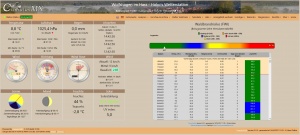Website Generator
Introduction
While CumulusUtils started as a collection of modules to be used at will in the creation of a weather website - for the site of the author - after several modules it became clear that generation of a complete website would not be too difficult. It required a HTML framework within which the modules would fit, a menu, a runtime system to handle the realtime data, loading of files, clocks, sun and moon and an adaptation of mcrossley's gauges or a rewrite of a total new set of gauges.
The work set out on a scratch board where the site was drafted and the runtime was coded. The choice was made to split the screen in two in a 5/7 ratio which never changed since. The right pane became the ReportView where the user chooses the report he wishes to see while the realtime data are always visible in the left pane, the Dashboard. The contents of the Dashboard can be seen can be switched from what you see in the image right to a Dashboard with only gauges.
In the example on the image on the right you see Holgers' fully translated site with expanded user menu and even multilingual by his own design to show off the things possible with the CumulusUtils framework.
Operation
The website generation includes in principle all modules. It is created with the following command:
utils/bin/cumulusutils.exe Website
Output
The output of the website generation is the output of all individual modules and in addition:
- index.html
- cumulusutils.js
- cumuluscharts.txt
- HighchartsLanguage.js
These files will be generated by the Website command. If you did not change anything, apart from the index.html they do NOT need to be uploaded (see the Thrifty qualifier)
Inifile parameters
The Website section is the largest parameters section. Not all parameters will be reproduced here, see the Cumulusutils.ini article. Only the important individual parameters will be discussed, the others are discussed as a group.
[Website] GoogleStatsId= => When not empty, a google stats code fragment will be generated with this code as the user Id PermitGoogleOptout=true | false => Permits to generate code so the users own access to the site will not be measured CumulusRealTimeLocation= => see below ShowInsideMeasurements=true | false => when true, inside temperature and humidity will be shown on the website (when available in the datafile CumulusRealTimeInterval=30 => The refresh cycle time of the runtime system to update the values on the dashboard and gauges ShowUV=true => Show the UV values (if there is a sensor) ShowSolar=true => Show the solar radiation values (if there is a sensor) HeaderLeftText= => A free plain or HTML formatted text destined at the left side of the header HeaderRightText= => A free plain or HTML formatted text destined at the right side of the header SiteTitleAddition= => A free text addition to the title
All parameters starting with Color affect the Bootstrap elements relevant for the interface and give the user the possibility to create a personal touch to the presentation.
All parameters starting with Steelseries affect the presentation of the gauges. You may find examples here and here.
All parameters starting with Threshold give a definition in pairs for a red led within a gauge to start flashing when the given boundary has surpassed.
All parameters starting with Home apply to the Home page graphs and give the user the possibility to explicitly set non-default colours.
When colours go in three they are gradient colours. If only the first colour is used, no gradient effect is seen.
CumulusRealTimeLocation
The parameter CumulusRealTimeLocation gives the user the possibility to setup the CumulusUtils website beside a main website and share the realtime and datafiles with the other site. If there is a directory structure like:
\ as webroot
|
- cutils\ as directory where the CumulusUtils site is located
|--- lib\
|--- css\
|--- CUicons\
Then, when CumulusMX sends the realtime and datafiles to the webroot, you can set the CumulusRealTimeLocation to ..\ and it will automatically find the realtime and datafiles it needs.
